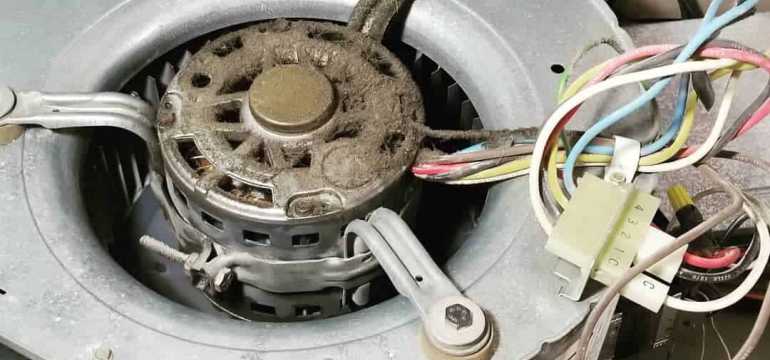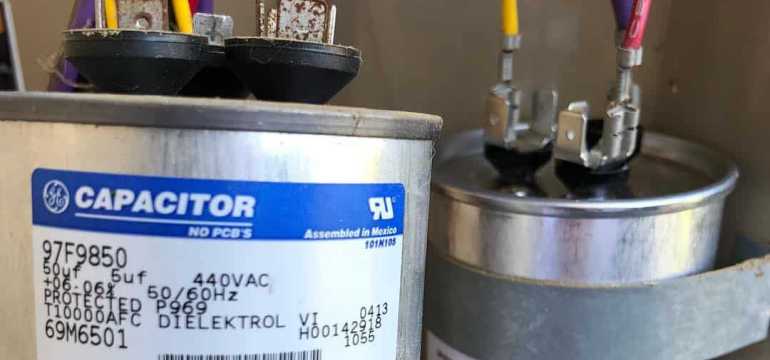Your furnace’s blower plays a big role in keeping your home warm. It’s powered by a motor, which is what allows it to function.
But there might be times when you start hearing your furnace blower motor make noise. When that happens, it’s usually a sign that the motor is either damaged or has worn-out parts.
But the specific problem with your furnace blower motor can vary. You may be able to pinpoint the issue by understanding the exact sound you’re hearing.
We put together this article to help you do that. Keep reading to learn everything that you need to know about a furnace blower motor making noise while starting.
Why your furnace blower motor make noise when starting

The truth is, a noisy furnace blower motor can be a sign of many things. Sometimes, the sound that you hear can be a clue to what the problem is.
Here are some of the main problems that can lead to a noisy furnace blower motor at start-up.
Belt issues
Your furnace blower motor relies on belts to function. When these stop working as they should, you may start hearing noises.
- Belts become worn over time. You need to replace them every so often. If you use your belt for longer than you should, then it could break entirely.
- It’s also possible that your belt isn’t worn out but loose instead. A loose belt will cause the pulley on the motor to turn faster than the belt can move. This creates a rubbing effect, which leads to a squealing noise. You may be able to simply tighten the belt to fix the problem. Or you might have to replace the belt if you have the wrong size.
- While you’re examining your belt, it’s also worth looking at your pulley. If a pulley gets loose, it could shorten the lifespan of your furnace while also creating an annoying noise.
Blower bearings
The noise that you’re hearing could also be coming from loose blower bearings.
- Blower bearings get loose as they wear down. This means they can also create a squealing noise.
- Additionally, your blower bearings need lubricant to function properly. If your furnace blower motor is squealing, it could also be due to a lack of lubricant. The fix for this problem is to have a professional HVAC maintenance worker come out to take a look at your system. You could try adding lubricant yourself. But this can be a more complicated job than you think.
- While the repair worker is looking at your system, consider having them replace the whole motor assembly. This will usually cost about the same as just replacing your bearings. And it’ll help your system run for longer.
Blower fan problem
Your blower fan is what forces warm air throughout your home. Problems with it can lead to a few different types of noises.
Humming can occur when:
- Dirt has built up in and around the fan
- The blades are bent
- The bearings are worn, causing it to oscillate
A professional may be able to repair the blower fan problem without replacing it. But if they do have to replace it, they’ll need to remove the entire cage around it to do so.
Rattling is another noise you might hear. This is usually caused by vibration. If your system is rattling, it means you probably have a loose part.
The trouble is, the loose part could be anything, including:
- Blower motor mount
- Cage
- Pipe brackets
- Burner parts
- Plenum
- The furnace itself
- A filter that’s too small
Sometimes, installing an acoustic rubber pad under the furnace can help to fix it. This can be especially useful if the furnace sits on concrete.
Unbalanced blower wheel
- The noise you’re hearing could also be coming from an unbalanced blower wheel. This can cause both thumping and scraping.
- Thumping can be caused by dirt build-up, wear on the shaft, or problematic blades. To fix this, you need to remove the entire cage. This is a fairly big job, so be sure that you need it done before paying for it.
- Scraping occurs when metal rubs against metal. This can happen when you have a loose or broken blower wheel. You can fix it by tightening all parts and replacing any broken ones.
Problems with your motor mount
Your motor mount could also be the source of the noise that you’re hearing if it’s loose or broken. This usually sounds like scraping. You may need to tighten or replace your mount to fix the problem.
The sound could be coming from another part of your furnace
If you’re hearing a noise when your furnace starts up, that doesn’t necessarily mean it’s coming from the blower motor. You could also hear one of the following noises, which may indicate a problem elsewhere in your system.
Buzzing
The most common source of a buzzing sound is a loosely mounted transformer box. This is a small box in the furnace that has wires on both sides.
Buzzing can also come from the blower motor. This typically happens because of the faulty capacitor. This device helps the motor start. If the capacitor is faulty, the motor might buzz.
Banging
There are a few different reasons why your system might produce a banging noise.
First, it could have a delayed gas ignition issue. This usually happens right when the furnace turns on. It means the system isn’t ignited as it should.
Here are some of the main causes of a delayed gas ignition problem:
- Broken pilot light
- Dirty/misaligned burners
- Contracting or expanding air ducts
- Lower-than-needed gas supply
- Too much air being mixed with gas
If the banging occurs while the furnace is running, it could be expanding or contracting air ducts.
Ducts are made of sheet metal. This causes them to expand and contract periodically. So a little banging is okay. But if you hear it often, it could be a sign of a problem.
There are three main things that can lead to extra loud ducts:
- Undersized or problematic ductwork
- Closed and obstructed vents
- Dirty air filter
High-pitched squeaking
Does your system have a high-pitched squeaking noise coming from it? If so, the problem is likely with your blower speed.
This is an easy fix. You just need to adjust the speed of your blower fan to get rid of the noise.
That being said, if the noise is more of a whistling, it could be a low airflow problem instead. This means your system isn’t pulling in enough air from outdoors.
Clicking noises
It’s perfectly normal to hear a clicking noise when you turn your furnace on and off. That’s the sound of the pilot light coming on and off.
But if the clicking noise continues, it could be caused by a number of issues, including:
- Broken or loose interior parts
- Dirty or broken flame sensor (also called a thermocouple)
- Faulty ignition board or bad valve, keeping gas from reaching the system
If you’re having this problem, don’t handle it yourself. Dealing with gas and pilot lights should be left to a professional, as doing so can be quite dangerous.
Whining
Your system might also produce an annoying whining noise. The good news is that this typically isn’t as serious as some of the other noises in this article. But it still needs to be addressed.
A whining noise can be caused by:
- A busted blower motor
- Lack of lubricant on the shaft bearings
- A loose, slipped, or frayed blower belt
Regardless, the best solution is to call a professional out for assistance. They’ll make sure you find the problem and fix it so your system gets back to normal.
A faulty capacitor could damage your system

Another thing to note about furnace noises is the importance of fixing a faulty capacitor once you’ve identified it.
Capacitors store energy and stabilize voltage across your HVAC system. They provide the uninterrupted flow of electricity that your system needs to function.
- A bad capacitor is one of the most common causes of overheating. As a result, the bearings can wear out.
- When a capacitor goes bad, the blower motor won’t be able to push air through your home. That means you won’t get the hot air distribution that you want. And your system could work harder to provide it, which might damage it in the long run.
Strategies for making your furnace blower quieter
Having a noisy furnace blower can be really annoying. If you’re experiencing this problem, you can call out a professional to try and fix it.
But you may also be able to reduce the noises that you’re hearing on your own. Here are some of the best strategies for achieving that:
- Adding sound insulation to the unit
- Adding more ducts to your system
- Replacing your rubber mounts
- Tightening the belt
- Checking the fan for dirt, bent blades, and worn bearings
- Lubricating the motor regularly
Blower fan maintenance is really important
If you really want to get rid of those annoying blower fan noises and ensure they never come back, maintenance is the answer. Your system needs consistent maintenance to avoid burnout.
That means:
- Changing the air filter regularly
- Vacuuming the air register once a month
- Cleaning the blower fan on a regular basis
These are all things that a professional can do for you. So it’s best to form a relationship with one in your area who can make sure your maintenance is always up-to-date.
- What to Do if Your House Smells Like Gas but There’s No Leak - February 6, 2023
- Why Is There a Burning Smell Coming From My Vents? - August 16, 2022
- How to Remove the Musty Smell From Your Air Conditioner - August 16, 2022
